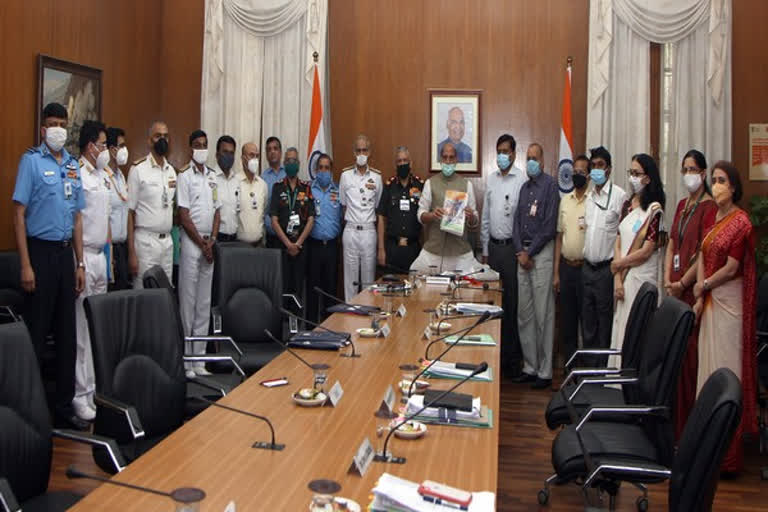New Delhi:Defence Minister Rajnath Singh on Monday unveiled the Defence Acquisition Procedure (DAP) 2020 which is aligned with the government's vision of Atmanirbhar Bharat and giving an impetus to the Make in India initiative.
A press statement from the Ministry of Defence said, "Raksha Mantri Shri Rajnath Singh on Monday unveiled the Defence Acquisition Procedure (DAP) 2020 in New Delhi. The first Defence Procurement Procedure (DPP) was promulgated in the year 2002 and has since been revised periodically to provide impetus to the growing domestic industry and achieve enhanced self-reliance in defence manufacturing."
Raksha Mantri had approved the constitution of Main Review Committee under Chairmanship of DG (Acquisition) Shri Apurva Chandra in Aug 2019 for preparation of DAP-2020. DAP 2020 will be applicable with effect from 1 October 2020, the press statement read.
Formulation of DAP 2020 has been done over more than one year, incorporating comments/suggestions from a wide spectrum of stakeholders... DAP 2020 has been aligned with the vision Atmanirbhar Bharat and empowering Indian domestic industry through Make in India initiative with the ultimate aim of turning India into a global manufacturing hub, the Ministry said. The Ministry added that with the announcement of the new Foreign Direct Investment policy, DAP 2020 has adequately included provisions to encourage FDI to establish manufacturing hubs both for import substitution and exports while protecting interests of Indian domestic industry.
Read:|Defence Ministry invites suggestions, comments on 'Defence Acquisition Procedure 2020'
Specific reforms enunciated in Atmanirbhar Bharat Abhiyan have been incorporated as follows:Notify a list of weapons/platforms for an import ban. Relevant incorporation has been done in the DAP to ensure that NO equipment as mentioned in the list is procured ex import post timelines notified.
Indigenisation of Imported Spares--Request for information (RFI) stage will explore the willingness of the prospective foreign vendors to progressively undertake the manufacture and set up an indigenous ecosystem at the spares/sub-component level.
The new category of buy (global -manufacture in India)--The new category incorporates 'manufacture of either the entire/part of the equipment or spares/assemblies/sub-assemblies/maintenance, repair and overhaul (MRO) facility for the equipment, through its subsidiary in India.
Co-production through IGA--This enables the establishment of co-production facilities through IGA achieving 'import substitution' and reduce life cycle cost.
Contractual enablement--Buyer's Right to optimise life cycle support costs and system enhancements through indigenous ecosystem incorporated.
FDI in Defence Manufacturing-- With the announcement of new FDI Policy, suitable provisions have been incorporated like new category 'buy (global-manufacture in India)' done to encourage foreign OEMs to setup 'manufacturing/maintenance entities' through its subsidiary in India while enabling requisite protection to the domestic industry.
Time-bound defence procurement process and faster decision making--As part of the defence reforms announced in the Atmanirbhar Abhiyan, setting up of a PMU has been mandated to support contract management. The PMU will facilitate obtaining advisory and consultancy support in specified areas to streamline the acquisition process.
Other issues included in these reforms are--Realistic setting of GSQRs of weapons/platforms. The process of formulation of SQRs has been further refined with greater emphasis on identifying verifiable parameters based on analysis of 'comparative' equipment available in the world and domestic markets.
Simplification of trial procedures-- DAP 2020 emphasises the need to conduct trials to nurture competition based on the principles of transparency, fairness and equal opportunities to all and not as a process of elimination.
Ease of doing business-- One of the key focus areas of the review was to implement 'ease of doing business' with emphasis on simplification, delegation and making the process industry-friendly with certain specific provisions incorporated.
Read:|Defence Minister Rajnath Singh launches 'Atma Nirbhar Bharat Saptah'
Procedural changes--Single-stage accord of AoN in all cases up to Rs 500 crore has been instituted thereby reducing time. FTP cases, post accord of AoN, will be progressed as per delegated powers thereby reducing the procurement cycle considerably. In the Planning Process, LTIPP has been re-designated as an Integrated Capability Development Plan (ICDP) covering the planning period of ten years instead of 15 years.
Request for Proposal (RFP) and Standard Contract Document (SCD)--Certain measures to provide clarity and alignment of requirements as also enabling provisions have been incorporated in the RFP and SCD in terms of Flow Chart is driven guidelines, provision of in-storage preservation and termination of contracts in cases where projects are not progressing as per pre-defined milestones.
Salient features of DAP 2020--Reservation in categories for Indian vendors. The categories of buy (Indian-IDDM), Make I, Make II, Production Agency in design & development, OFB/DPSU and SP model will be exclusively reserved for Indian vendors meeting the criteria of ownership and control by resident Indian citizens with FDI not more than 49%. This reservation will provide exclusivity in participation to domestic Indian industry.
A simple and practical verification process has been instituted and IC will now be calculated on 'Base Contract Price' i.e. total contract price fewer taxes & duties. Promoting the use of indigenous military material with provisions for the examination of platforms and other equipment/ systems and reward for vendors for using indigenous raw material.
Indigenous software--Provision for exploring options for operating base applications like Fire Control System, Radars, Encryption, Communications etc on indigenous software in Buy (Indian- IDDM) & Buy (Indian) cases has been included.
